Business Meeting Invitation Letter
[Your Name]
[Your Title/Position]
[Your Company Name]
[Your Company Address]
[City, State, Zip Code]
[Email Address]
[Phone Number]
[Date]
[Recipient's Name]
[Recipient's Title/Position]
[Recipient's Company Name]
[Recipient's Company Address]
[City, State, Zip Code]
Dear [Recipient's Name],
I hope this letter finds you well. I am writing to extend an invitation on behalf of [Your Company Name] to participate in a business meeting. As a valued industry professional, we believe your insights and expertise would be invaluable in discussing important matters related to [briefly mention the meeting's purpose or topic].
The details for the meeting are as follows:
Date: [Meeting Date]
Time: [Start Time] to [End Time]
Venue: [Meeting Venue]
Address: [Venue Address]
Agenda:
1. Introduction and Welcome
2. Presentation on [Meeting Topic]
3. Discussion and Q&A session
4. Networking and Collaboration Opportunities
The aim of this meeting is to foster collaboration, share knowledge, and explore potential areas of mutual interest. We have carefully selected key participants to ensure a productive and engaging discussion.
We kindly request your presence and active participation to contribute to the success of this meeting. Your expertise in [mention the specific area of expertise] will undoubtedly add value to the discussions. Your input will be crucial in shaping the outcome and potential collaborations arising from this meeting.
Please confirm your availability by [mention a specific deadline for confirmation]. If you have any questions or require further information, please feel free to contact me at [Your Phone Number] or [Your Email Address].
Thank you for considering this invitation. We look forward to your positive response and the opportunity to meet you in person.
Sincerely,
[Your Name]
[Your Title/Position]
[Your Company Name]
Formal Business Meeting Invitation Letter
Dear [Recipient Name],
We are pleased to invite you to attend a business meeting scheduled for [Date] at [Time] in [Location]. The agenda will cover [specific topics or objectives], and your insights and participation will be highly valuable.
Please confirm your attendance by [RSVP Date]. We look forward to your presence.
Sincerely,
[Your Name]
[Position]
[Company Name]
Professional Business Meeting Email
Subject: Invitation to Business Meeting on [Date]
Dear [Recipient Name],
You are cordially invited to attend a business meeting on [Date] at [Time] via [Venue/Online Platform]. The discussion will include [Agenda Topics] and strategic planning for upcoming projects.
Kindly RSVP by [RSVP Date] to confirm your attendance.
Best regards,
[Your Name]
[Position]
[Company Name]
Casual Business Meeting Invite Message
Hi [Recipient Name],
Just a quick note to invite you to our business meeting on [Date] at [Time]. We’ll be going over [Topics] and would love your input.
Please let me know if you can make it.
Thanks,
[Your Name]
Funny / Lighthearted Business Meeting Invitation
Hello [Recipient Name],
Mark your calendar! Our business meeting is happening on [Date] at [Time]. Agenda: serious work, strategic discussions, and coffee breaks disguised as brainstorming sessions.
We need your brilliant ideas and sense of humor. RSVP so we can save you a seat!
Cheers,
[Your Name]
Preliminary Business Meeting Invitation Letter
Dear [Recipient Name],
This is to provide an initial invitation for a business meeting tentatively scheduled for [Date] at [Time]. The agenda is currently under preparation, but we wanted to ensure you have early notice.
Further details will follow. Please tentatively hold your schedule.
Kind regards,
[Your Name]
[Position]
[Company Name]
Quick Business Meeting Email
Subject: Quick Invite: Business Meeting
Hi [Recipient Name],
You are invited to a business meeting on [Date] at [Time]. Agenda topics: [briefly list]. Please confirm your attendance.
Thanks,
[Your Name]
What is a Business Meeting Invitation Letter and Why It Is Needed
A Business Meeting Invitation Letter is a formal or informal notice sent to individuals to request their participation in a scheduled meeting.
Purpose:
- Inform attendees of the meeting’s date, time, and location.
- Communicate the agenda and objectives clearly.
- Ensure timely participation and proper preparation.
Who Should Send a Business Meeting Invitation Letter
- Managers or team leaders organizing the meeting.
- Event coordinators or administrative staff in larger companies.
- Project heads or department heads depending on the meeting type.
Whom Should Receive a Business Meeting Invitation Letter
- Internal team members and employees involved in the project.
- Clients, stakeholders, or external partners when relevant.
- Senior management if their approval or input is required.
- Departments affected by the meeting’s agenda.
When to Send a Business Meeting Invitation Letter
- Prior to scheduled meetings, ideally at least 3–7 days in advance.
- Before urgent or ad-hoc meetings, as soon as possible.
- For recurring meetings, at the beginning of each cycle.
- Prior to strategic, planning, or project milestone meetings.
How to Write and Send a Business Meeting Invitation Letter
- Determine the meeting type, agenda, and participants.
- Use clear, professional, and concise language.
- Include essential details: date, time, location, agenda, and RSVP instructions.
- Choose the appropriate mode: email for quick delivery, printed letter for formal occasions.
- Review for accuracy and completeness before sending.
Formatting Guidelines for Business Meeting Invitation Letters
- Length: 1–2 short paragraphs for clarity.
- Tone: Professional, formal, or casual depending on audience.
- Wording: Clear, actionable, and polite.
- Style: Structured, with bullet points for agenda if needed.
- Etiquette: Include RSVP details and express appreciation for attendance.
Requirements and Prerequisites Before Sending
- Confirm the meeting date, time, and venue.
- Prepare the agenda and discussion points.
- Identify attendees and their availability.
- Have contact information for all recipients.
- Decide the mode of communication (email, letter, or message).
After Sending / Follow-up Actions
- Monitor RSVPs and attendance confirmations.
- Send reminders 1–2 days prior to the meeting.
- Prepare materials or presentations based on attendee confirmations.
- Document feedback or responses for record-keeping.
Pros and Cons of Sending a Business Meeting Invitation Letter
Pros:
- Ensures attendees are informed and prepared.
- Provides a written record of the meeting schedule.
- Reduces misunderstandings regarding timing and agenda.
Cons:
- Late delivery can reduce effectiveness.
- Overly long or unclear letters may confuse recipients.
- Excessive use of formal letters for casual meetings may seem rigid.
Common Mistakes to Avoid in Business Meeting Invitations
- Omitting essential details like date, time, or location.
- Sending invitations without confirming participant availability.
- Using overly complex or confusing language.
- Forgetting RSVP instructions or deadlines.
Essential Elements and Structure of a Business Meeting Invitation Letter
- Greeting: Address the recipient personally.
- Invitation Statement: Clearly state the purpose of the meeting.
- Date, Time, and Venue: Include all necessary details.
- Agenda: List discussion points or objectives.
- RSVP Instructions: Specify confirmation procedure and deadline.
- Closing: Professional sign-off with name and position.
- Optional Attachments: Agenda documents or background materials.
Tricks and Tips for Effective Business Meeting Invitations
- Use bullet points for agenda items to improve readability.
- Send calendar invites alongside the letter for convenience.
- Personalize greetings to increase engagement.
- Set reminders and follow up with key attendees.
- Keep language clear, concise, and actionable.
Compare and Contrast with Other Meeting Notifications
- Invitation vs. Meeting Memo: Invitations request attendance; memos may simply inform about a meeting.
- Invitation vs. Calendar Reminder: Calendar reminders are supplementary; invitations are formal communication.
- Invitation vs. Follow-up Notes: Invitations precede the meeting; follow-up notes summarize or confirm post-meeting actions.
FAQ About Business Meeting Invitation Letters
Q: Can this letter be sent digitally?
A: Yes, email or messaging platforms are common, especially for internal teams.
Q: Should all agenda items be included?
A: Include key points and objectives; detailed materials can be attached.
Q: Is RSVP mandatory?
A: While not always mandatory, RSVPs help with planning and logistics.

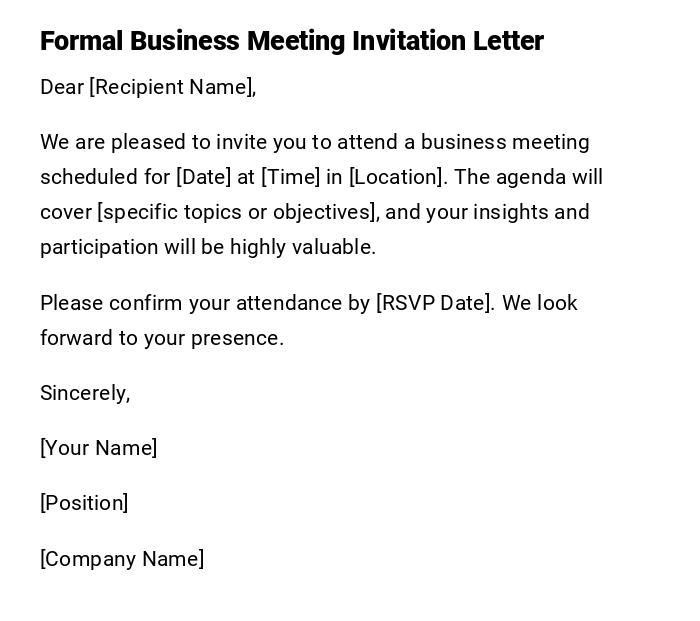
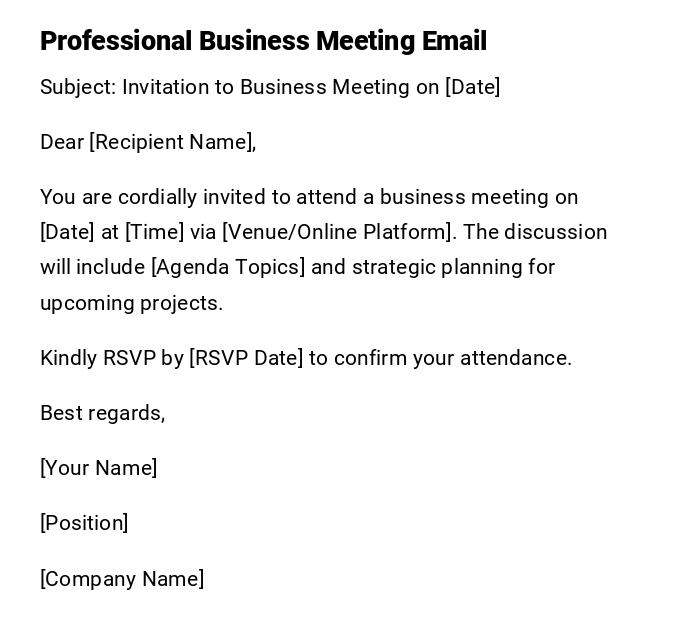
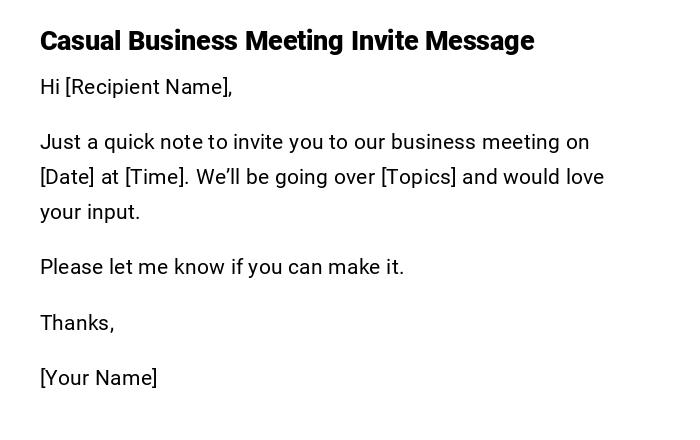
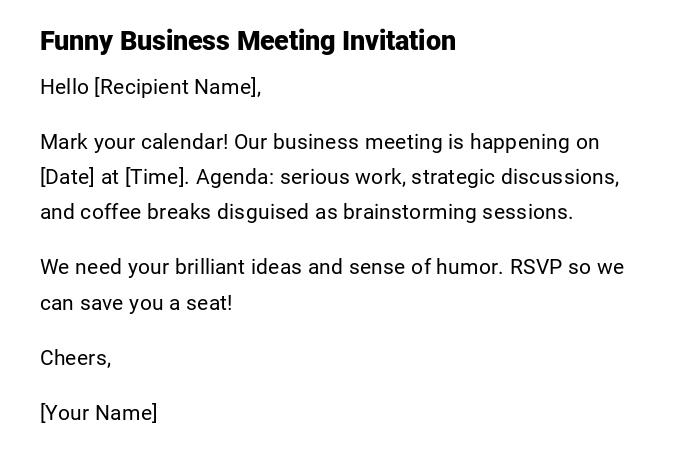
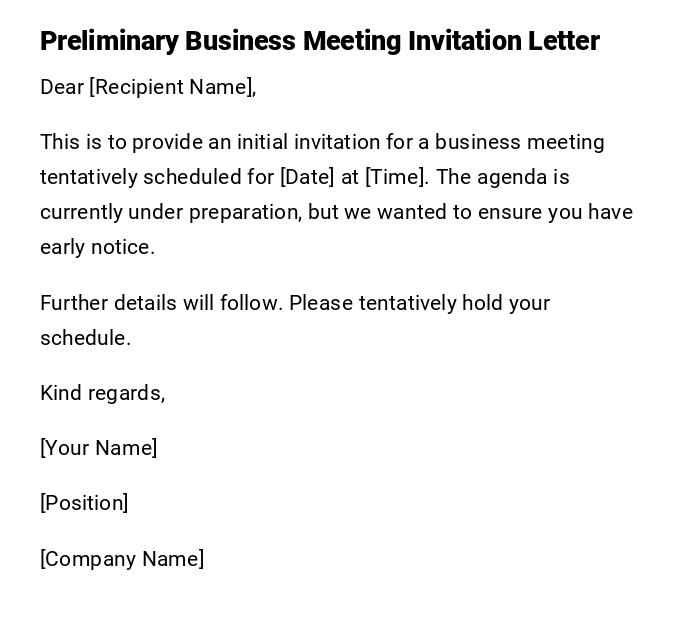
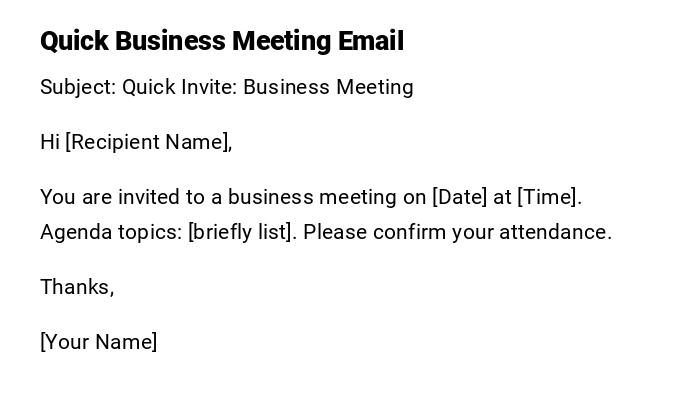

 Download Word Doc
Download Word Doc
 Download PDF
Download PDF